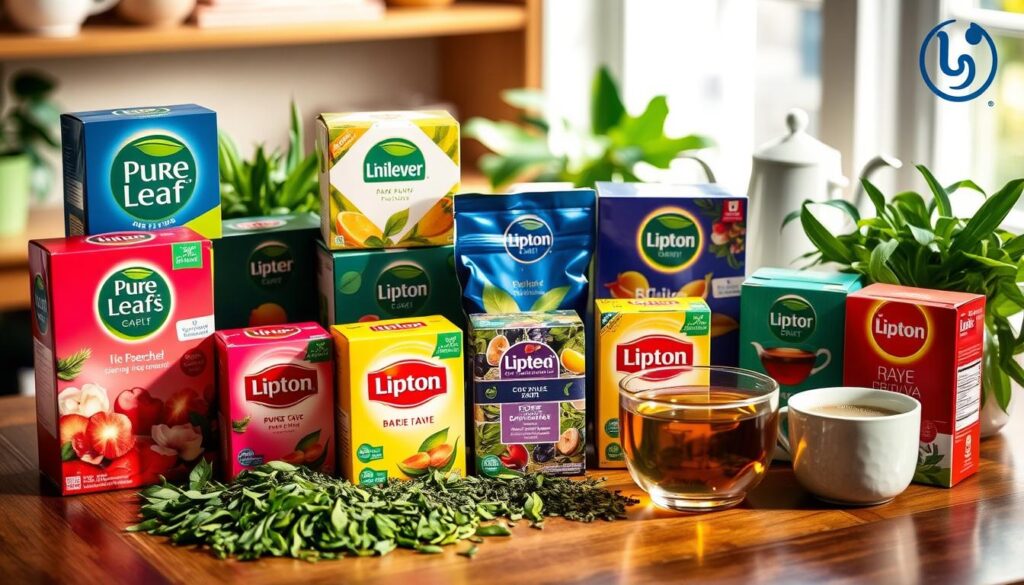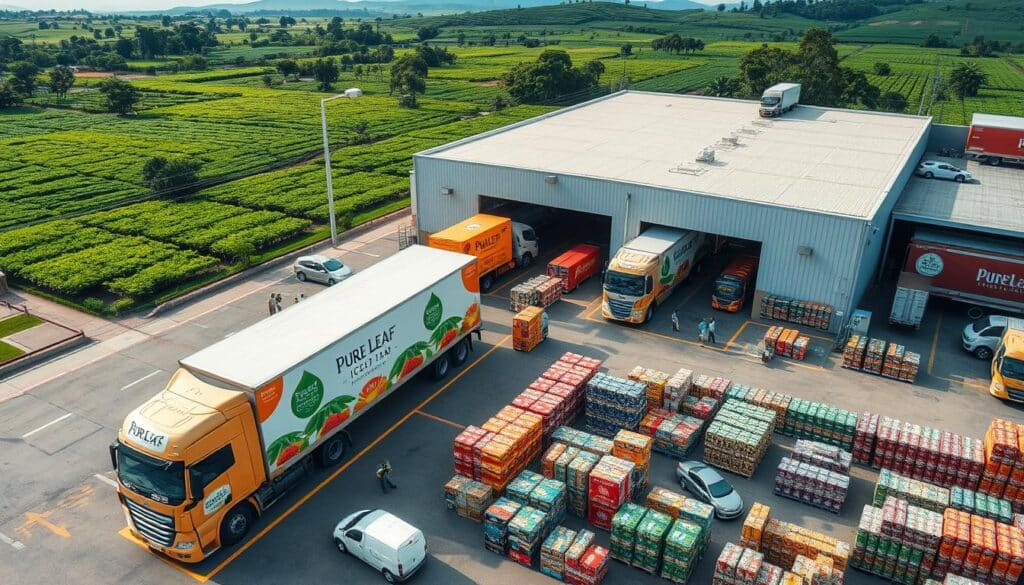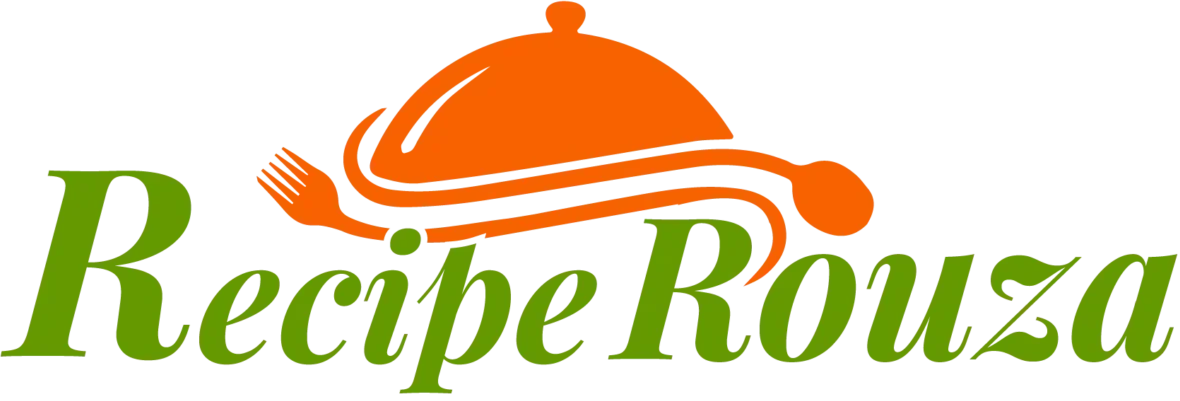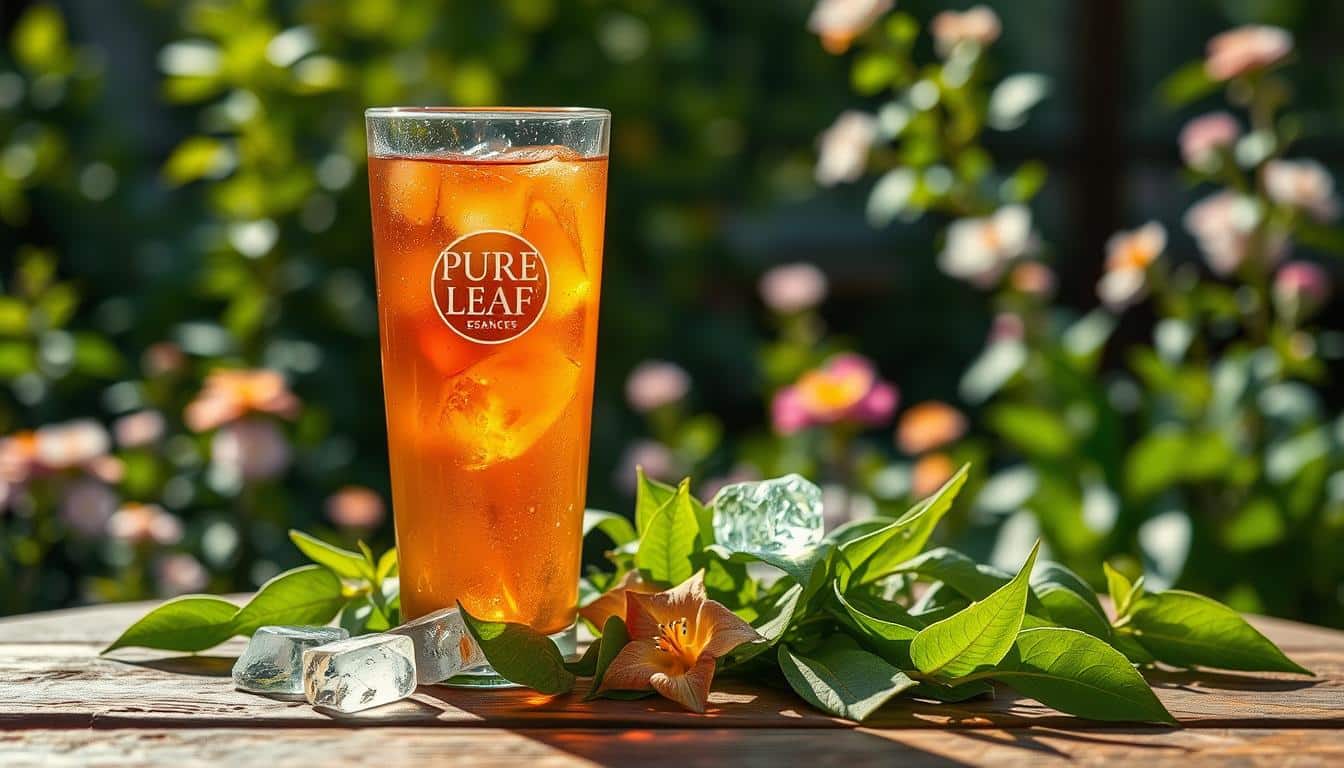As a tea lover, I’ve always wondered about the brands I drink. I asked myself, “Is Pure Leaf owned by Lipton?” This question took me on a journey through the tea industry’s complex world. I found a story of mergers, partnerships, and the growth of famous tea brands.
Understanding the Tea Industry Giants
The tea industry is huge and always changing. Big names like PepsiCo, Coca-Cola, and Unilever lead the way. They have big parts of the market and shape what people like and want.
Major Players in the Global Tea Market
PepsiCo is a big name in tea. It works with Unilever on Lipton, making over $1 billion a year. Other big players like Coca-Cola and Arizona also have a big spot in the tea world.
Market Share Distribution
The big players share the market. Pure Leaf has about 21% of it. Lipton and Brisk are close behind. Newcomers like Saint James, who started in 2021, are also making a mark, being in over 7,000 stores.
Industry Growth Trends
Tea lovers are trying new things. Some prefer herbal teas, energy drinks, or kombucha over black tea. This change makes companies update their products and how they market them.
“The tea industry is a dynamic and highly competitive landscape, with major players constantly vying for a larger share of the global market.”
Is Pure Leaf owned by Lipton?
Pure Leaf is a well-known iced tea brand, but it’s not owned by Lipton. Instead, it’s part of the PepsiCo-Lipton Partnership. This partnership is between PepsiCo and Unilever, which owns Lipton.
The partnership was created to make and sell ready-to-drink tea drinks. This includes Lipton, Pure Leaf, and Brisk. PepsiCo makes and sends out Pure Leaf in many places. Unilever takes care of the Lipton brand. This setup lets both companies use their skills to offer great tea to people.
Almost 90% of people say Pure Leaf Unsweetened Iced Tea tastes like homemade tea. This shows Pure Leaf’s focus on quality and real taste. Pure Leaf also started a sweepstakes with special “Martha’s Little Helper” bottles, made with Edelman.
The new campaign wants people to pick Pure Leaf over making their iced tea. This follows the success of a campaign with Martha Stewart. Pure Leaf’s North America manager, Julie Raheja-Perera, said people like it, so they’re doing more to get iced tea fans excited.
| Statistic | Details |
|---|---|
| Nearly 90% of consumers agree that Pure Leaf Unsweetened Iced Tea tastes like homebrewed tea | According to PepsiCo’s “Central Location Taste Test” by RTi Research, conducted on 23 August 2023 |
| Consumers can enter the sweepstakes for a chance to win a limited edition “Martha’s Little Helper” bottle of Pure Leaf Unsweetened Tea | The sweepstakes is open until 16 October at PureLeaf.com/PureLeafPromotion |
| The campaign featuring Martha Stewart promoting Pure Leaf Unsweetened Iced Tea was developed by the global public relations and marketing consultancy firm Edelman | Edelman is a well-known agency that has worked with various consumer brands on their marketing campaigns |
In conclusion, Pure Leaf and Lipton are connected through the PepsiCo-Lipton Partnership. This partnership lets them use their strengths to make and sell top-notch iced tea.
The PepsiCo-Lipton Partnership Explained
The PepsiCo-Lipton Partnership is a great example of a successful team-up in the beverage world. It started in 1991, bringing together PepsiCo and Unilever, Lipton’s parent company. They work together to make and sell tea drinks under big names like Lipton, Pure Leaf, and Brisk.
Formation of the Joint Venture
This partnership was made to use PepsiCo’s big distribution network and Unilever’s tea know-how. They wanted to grow in the tea market and offer top-quality tea drinks to people.
Distribution Networks
The partnership’s success comes from its strong distribution. PepsiCo’s wide reach lets Lipton and Pure Leaf brands get to many people in North America. This team-up helps these teas become more popular by making them easy to find.
Brand Management Structure
Managing Lipton and Pure Leaf brands is a team effort between PepsiCo and Unilever. PepsiCo takes care of getting the drinks to stores and promoting them. Unilever focuses on making sure the tea is of the best quality and stands out in the market.
The PepsiCo-Lipton Partnership shows how working together can lead to success in the tea market. It’s a great example of how different strengths can help each other grow.
Pure Leaf Brand History and Development
The Pure Leaf tea brand has a fascinating history. It started with the ancient Chinese emperor Shennong discovering tea in 2732 BCE. Tea has been valued for centuries, from being used as money in the Ming Dynasty to becoming popular in 18th-century England.
In recent times, Pure Leaf was created as a top-notch iced tea. It came from a partnership between PepsiCo and Lipton. This partnership used Lipton’s tea blending skills and PepsiCo’s brand expertise. Pure Leaf offers a real-brewed tea option, using real tea leaves and natural ingredients.
Pure Leaf has grown as the tea market expands. Countries like Turkey and Ireland lead in tea drinking. The brand has become a key player in the iced tea market, helping PepsiCo’s wide range of drinks.
Pure Leaf’s success comes from its commitment to quality, authenticity, and innovation. These values appeal to health-focused consumers looking for a better tea experience. As the tea industry changes, with a focus on sustainability and new tastes, Pure Leaf will keep growing by adapting to these changes.
Unilever’s Role in Tea Brand Ownership
Unilever is a big name in the tea world. It owns famous brands like Lipton, PG Tips, and Brooke Bond. These brands help Unilever stay strong in the global tea market.
Portfolio of Tea Brands
Unilever’s tea brands meet many tastes. In 2014, it added fruit, herbal, and green teas to PG Tips. This move helped the brand grow beyond just black tea.
In 2023, PG Tips launched a quick-brew teabag. It can make tea in just 60 seconds. This shows the brand’s commitment to making things easier for customers.
Unilever also cares about the environment. PG Tips became Rainforest Alliance certified in 2012. This follows Unilever’s promise to use sustainable tea since 2007.
Global Market Strategy
Unilever uses its wide reach and strong brands to succeed worldwide. It focuses on new ideas, being green, and meeting customer needs. This keeps it ahead in the fast-changing tea market.
As a top player in Unilever tea brands, Unilever’s choices shape the global tea market and beverage company strategy.

Understanding Brand Licensing in Beverages
Brand licensing is a key strategy in the beverage world. It helps companies grow by using their name and reputation. A great example is the PepsiCo-Lipton Partnership. This partnership has made a big splash in the tea market.
| Key Insights | Data |
|---|---|
| Consumers’ Demand for Better-for-You Alternatives | Several PepsiCo and Coca-Cola brands are engaging consumers interested in better-for-you alternatives to traditional sodas and beverages. |
| Barriers to Tea Brand Purchases | The absence of a zero-sugar alternative is a “top barrier” that prevents people from buying a tea brand, according to Julie Raheja-Perera, general manager of North America for the Pepsi Lipton Partnership. |
| Importance of Refreshing Breaks | Research by Edelman Data & Intelligence indicates that three in five workers struggle to take breaks during the workday, and nearly two-thirds feel mentally, physically, and emotionally exhausted. However, 63% of respondents noted that when they do take quality breaks, they come back feeling recharged. |
| Brand Initiatives to Support Refreshing Breaks | Pure Leaf launched a “Tea Break Grant” program to support the cultural shift towards more refreshing breaks at an organizational level. |
| Consumer Engagement Campaigns | Pure Leaf’s nationwide text promotion from June 27 through July 25 offered a free bottle of Pure Leaf to consumers who texted “PureLeaf” to 737-377-3774. |
By using beverage brand licensing agreements, like the PepsiCo partnerships and tea brand agreements, companies can grow. They can offer more products and meet the needs of health-conscious consumers.
Pure Leaf’s Market Position and Competition
Pure Leaf has made a big splash in the premium ready-to-drink tea market. It stands out against big names like Coca-Cola’s Gold Peak and Arizona Beverages. Pure Leaf focuses on quality and a real tea taste, attracting those who want less sugar.
Sales Performance
Pure Leaf’s sales have soared, hitting $985 million in 2023. This beats out Arizona and Lipton, boosting PepsiCo’s drink sales. It shows Pure Leaf is a major player in the ready-to-drink tea market.
Consumer Demographics
Pure Leaf’s use of natural ingredients and true tea flavors draws in health-aware consumers. It’s especially popular with the younger crowd. This makes it well-positioned to meet the changing tastes of today’s tea lovers.
| Brand | Sugar Content (per 12-16 oz bottle) |
|---|---|
| Pure Leaf Honey Green Tea | 25g |
| Lipton Iced Tea Lemon | 24g |
| Red Diamond Southern Sweet Tea | 24g |
| Turkey Hill Lemon Iced Tea | 24g |
| Milo’s Famous Sweet Tea | 26g |
| Moonshine Original Sweet Tea | 30g |
| Snapple Peach Tea | 30g |
| Just Ice Tea Half Tea & Half Lemonade | 30g |
The global ready-to-drink tea market is expected to grow by 25% by 2028. This will reach a value of $138.15 billion. It shows Pure Leaf and other brands have a big chance to grow with tea consumer trends.
Manufacturing and Production Process
Pure Leaf’s real-brewed tea production is at the core of its quality promise. Unlike many bottled teas, Pure Leaf brews tea leaves directly. This method captures the full essence and flavor of the leaves, meeting the demand for natural beverages.
PepsiCo oversees Pure Leaf’s manufacturing, using its advanced facilities and quality control to ensure consistency. The tea leaves are selected, brewed, and bottled without powders or concentrates.
The tea brewing process is crucial. The degree of oxidation, a key step in tea processing, significantly influences the flavor profile of the final product. More oxidation makes darker teas like black tea, while less makes lighter teas like green tea. Controlling oxidation levels is key to Pure Leaf’s taste and aroma.
The Pure Leaf team focuses on every step of tea production, from plucking to drying. Common mistakes in tea processing, such as errors in plucking, over or under-withering, improper oxidation, inconsistent rolling, and inadequate drying, can significantly impact the final flavor profile. PepsiCo’s expertise in beverage manufacturing ensures a consistently excellent product.
“Kurush Bharucha, a tea industry veteran with 39 years of experience at Unilever/Lipton, has spent his career specializing in tea tasting and processing. His deep knowledge of the intricate nuances of tea manufacturing, from black oxidized teas to the complexities of Chinese and Japanese tea styles, has been invaluable in shaping the Pure Leaf production process.”
Pure Leaf focuses on real-brewed tea and controls the production process carefully. This commitment to quality and detail makes Pure Leaf stand out in the competitive beverage market.
Brand Distribution Strategy
Pure Leaf, a top iced tea brand, uses PepsiCo’s wide retail network. This makes Pure Leaf easy to find in many places. It’s in grocery stores, convenience stores, and food service outlets. The brand is also growing in international markets to meet global tea demand.
Retail Channels
Pure Leaf aims for a strong retail presence. It’s found in the chilled beverage sections of grocery stores. This makes it easy for shoppers to grab a bottle or can.
It’s also in convenience stores for those who need a quick, refreshing drink. Pure Leaf offers a high-quality iced tea option for busy people.
Geographic Presence
Pure Leaf started in North America but now reaches more places. Thanks to PepsiCo’s network, it’s available worldwide. This lets tea lovers everywhere enjoy Pure Leaf’s unique taste.
The brand’s strategy keeps products fresh and meets local tastes. This way, Pure Leaf can serve different tea cultures and tastes globally.

| Retail Channel | Geographic Presence |
|---|---|
| Grocery Stores | North America, Europe, Asia-Pacific |
| Convenience Stores | North America, Latin America, Middle East |
| Foodservice Outlets | Global Expansion |
Marketing and Brand Identity
Pure Leaf focuses on high-quality and real brewing. It uses natural ingredients and real tea leaves. This appeals to those looking for a better-iced tea.
The brand also cares about quality and the environment. This makes it popular with people who value health and sustainability.
Pure Leaf has updated its packaging and products. It now offers lower-sugar options and sustainable packaging. These changes show the brand’s commitment to quality and meeting market needs.
| Brand Statistic | Value |
|---|---|
| Consumers agree Pure Leaf Unsweetened Iced Tea tastes like homebrewed | Nearly 90% |
| Calories in Coca-Cola Company’s sweet tea label | 190 calories |
| Calories in Pepsi Lipton Tea Partnership’s sweet tea | 100 calories |
| The price of a gallon of Walmart sweet tea | Less than $3 |
Pure Leaf recently launched a “Tea Break” campaign. It aimed to highlight the need for more refreshment and rejuvenation. The campaign starred Lindsay Lohan and included a free Pure Leaf offer and a Tea Break Grant program.
Pure Leaf has built a strong brand identity through innovative marketing. It focuses on quality, sustainability, and self-care. This sets it apart in the competitive beverage market.
Future Growth and Innovation Plans
Pure Leaf is ready to grow as the tea market changes. It plans to focus on making new products and reaching more people. This will help the brand grow in the beverage world.
Embracing Product Innovation
Pure Leaf wants to keep up with new trends. It might add more flavors to its teas and make functional drinks. It could also start selling hot tea. This way, Pure Leaf can attract more customers.
Expanding Geographical Reach
Pure Leaf aims to sell its tea in more places. It wants to grow in areas where tea is becoming more popular. This will help Pure Leaf become a top tea brand worldwide.
Pure Leaf also plans to be more eco-friendly. It might improve its packaging and focus on sustainability. This shows the brand cares about the environment and its customers.
“The tea industry is evolving rapidly, and Pure Leaf is poised to lead the charge with its forward-thinking approach to product development and market expansion.”
Pure Leaf will keep listening to what customers want. This way, it can keep offering great tea experiences. It will stay a leader in the beverage industry’s future.
Conclusion
Pure Leaf is not owned by Lipton but is a result of a partnership between PepsiCo and Unilever’s Lipton tea division. This partnership has helped Pure Leaf grow by using PepsiCo’s wide distribution network and Unilever’s tea expertise. This has made Pure Leaf a big name in the iced tea market.
The tea industry is always changing, with new tastes and health trends. Pure Leaf has kept up by offering unique flavors and healthy drinks. This shows how the brand stays relevant and meets consumer needs.
Pure Leaf’s success shows the value of smart partnerships and focusing on what customers want. By combining PepsiCo’s reach and Unilever’s tea knowledge, Pure Leaf has become a top iced tea brand. It has a strong market spot and many loyal customers. As the tea market keeps changing, Pure Leaf is ready to stay ahead and grow more.
FAQ
Is Pure Leaf owned by Lipton?
No, Pure Leaf is not owned by Lipton. It’s part of the PepsiCo-Lipton Partnership. This is a team-up between PepsiCo and Unilever. They work together to make and sell tea drinks under brands like Lipton, Pure Leaf, and Brisk.
Who owns the Pure Leaf brand?
Pure Leaf is managed by the PepsiCo-Lipton Partnership. This is a team effort between PepsiCo and Unilever. PepsiCo takes care of making and selling Pure Leaf. Both companies work together on how to grow the brand.
What is the relationship between Pure Leaf and Lipton?
Pure Leaf is part of the PepsiCo-Lipton Partnership. This means it’s connected to Lipton through this partnership. Even though Pure Leaf isn’t directly owned by Lipton, they’re close because of this team-up.
How is the PepsiCo-Lipton Partnership structured?
The PepsiCo-Lipton Partnership is a team effort between PepsiCo and Unilever. PepsiCo is in charge of making and selling tea drinks. Unilever brings its tea know-how and helps manage the brands. This way, both companies can reach more people with their tea.
What are the key brands under the PepsiCo-Lipton Partnership?
The main brands under the partnership are Lipton, Pure Leaf, and Brisk. These tea brands are made and sold through the partnership. PepsiCo takes care of the production and distribution. Both companies work together on the brand strategy.
Recent Blog Posts :

